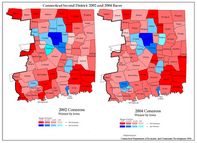The state House of Representatives yesterday rejected a measure that would have abolished the death penalty in Connecticut. The bill was brought partly in response to the looming execution of serial killer Michael Ross, who is due to be put to death by lethal injection on May 11th. The failure of the bill is not surprising; death penalty abolitionists admitted long before the measure came to the floor that they didn't have the votes to pass it.
Not surprisingly, the emotional debate was at times less about the death penalty than it was about Michael Ross himself:
Speaker after speaker stood to enumerate Ross' crimes, including Rep. Steve Mikutel, D-Griswold, who represents the families of Ross' two youngest victims, 14-year-olds Leslie Shelley and April Brunais, whom he abducted and strangled in 1984. (Mann)
Ross is the perfect execution candidate: his crimes were clear and heinous, the evidence against him is overwhelming, and he has no further wish to live. It's very hard to show him mercy, considering the horrifying acts he's committed.
“Who are the barbarians here?” Mikutel said, his voice rising. “Are we the barbarians because we want to execute the cold-blooded killers? ... Who really is the uncivilized person here?”
Picking up on a theme employed by others, Mikutel compared murderers like Ross and the others on death row to terrorists, and said they should be similarly condemned.
“The threat to society is the same,” he said. “They are enemies of the state and they deserve to die.” (Mann)
...
"For 20 years, [families of Ross's victims] have waited for justice," said Rep. Lawrence Cafero, R-Norwalk. "This is not about vengeance, this is about justice." (Pazniokas)
Opponents of the death penalty made similarly emotional arguments, to little avail.
"I believe in the words 'Thou Shalt Not Kill,' under any circumstance," [State Rep. William Dyson, D-New Haven] said in pleading for his colleagues to support the repeal measure. "I believe in it, I believe in it, I believe in it." (Hackett)
...
Rep. Michael P. Lawlor, D-East Haven, the co-chairman of the judiciary committee, urged the House to remove Connecticut's singular status in the Northeast: It is the only state from New Jersey to Maine with prisoners on death row. (Pazniokas)
Is this the heart of the matter... that we're going to be alone in our cultural zone in performing executions? Does this make us more like... them? Do we want to be in the same club as Texas, Florida and much of the rest of the nation? Is this why we're so squeamish?
The death penalty, much like abortion and the current row over Terri Schiavo, is an emotional issue at its core, and therefore a very difficult one to deal with in a rational manner. Studies show that executions don't seem to deter crime, and it has recently come to light that many people who have been executed may have been innocent. The justice system, flawed as it is, some say, should not impose a punishment so final that it can't be undone. Yet death penalty supporters don't waver, because they believe that to let a vicious killer like Ross live is far too kind to them:
[Rep. Alfred Adinolfi's (R-Cheshire)] eyes filled with tears as he described the murder, more than 30 years ago, of a beloved nephew, and his voice shook.
“I would vote to do away with the death penalty,” he said, “if we could come up with a more severe punishment.” (Mann)
In the end, the measure failed, despite coming closer to passing than any other similar bill has. It may be a long time indeed before Connecticut abolishes the death penalty, if it ever does. And, in a little under a month, Michael Ross will die at the hands of the state. His strange part in this, at least, will finally be done.
Sources
Pazniokas, Mark. "Death Penalty Survives". Hartford Courant 31 March 2005.
Mann, Ted. "House Upholds Death Penalty". New London Day 31 March 2005.
Hackett, Ray. "Death debate dies in House". Norwich Bulletin 31 March 2005.






